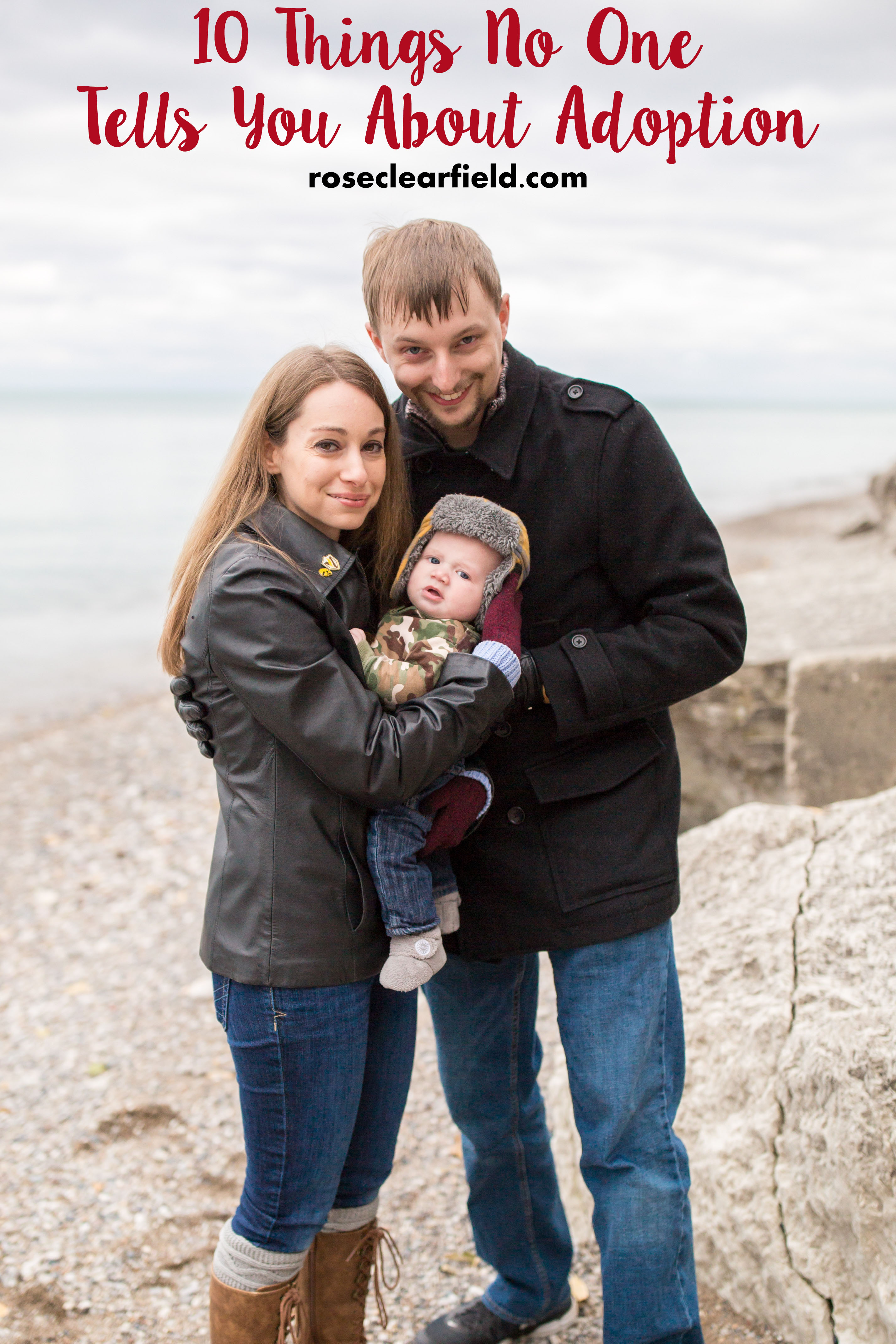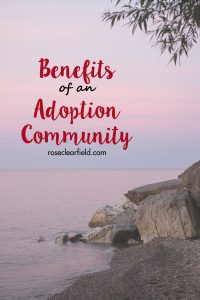Credit: Lottie Lillian Photography
A little over two years into the adoption journey and a little over seven months into having an adopted kiddo, I have a bit more perspective on adoption. I’m not worried about all of my emotions coming crashing down at any moment (although that could very easily still happen), and I’m not saying “surreal” to describe my current situation quite so much (even though it still applies). I don’t feel like I went into adoption totally blind. But like any life experience, you can never be fully prepared. Today I’m sharing 10 things no one tells you about adoption. Whether you’re just starting to consider adoption or you have several adopted children, I hope you’ll get something out of this post.
1. People will think you’re saving the world.
Funnily enough, I got more saving the world comments when we were still in the home study and waiting for profile opportunities stages of adoption than I do now with an adopted child. No, people don’t actually use the terminology “saving the world.” But there’s this whole “oh, it’s SO great you’re pursuing adoption” mentality. People are really excited for you, much more excited than they are when you’re trying to get pregnant. Now that I have a kid, there’s more of a “oh, that’s neat he’s adopted” mentality.
Yes, there are people who pursue adoption because they have a bit of a saving the world complex. But most people are just trying to grow their families. Particularly for domestic infant adoption, most adoptive couples have faced infertility or other medical challenges that have prohibited them from getting pregnant and simply want kids.
2. You’ll deal with a lot of misconceptions about adoption, especially open adoption.
We live in an age where open adoption is encouraged, and it’s the norm to start talking to your adopted children about adoption from birth. Through most of the history of adoption, it was very different. There is still so much sigma about adoption and what it means for your family. Most people also don’t understand what open adoption means. I’m not sure if TV and movies have done a poor job representing adoption and/or if there’s just this natural unease about birth family-adoptive family relationships. But pretty much the only people I talk to who truly understand what open adoption means have adopted kids themselves.
So let me put it out there for you: An open adoption is one in which both families agree to open contact with one another. In most cases, for infant domestic adoption, the families will meet, get to know each other a bit, and exchange contact information prior to or immediately following the birth. The adoptive family will receive medical information about both birth parents and get a copy of the birth paperwork from the hospital.
Open adoption doesn’t change the parental rights. Once the birth parents have terminated their rights, there is no turning back. If they were to try to take the child, it would be considered a kidnapping. I’m sure there are instances where this does happen, but it’s extremely rare.
Adoption agencies encourage open adoption because it makes it much easier for adopted children to get to know their birth families. They also receive a lot of information about their birth parents, even if they never meet them. If you don’t think this is a big deal, talk to someone who is adopted who knows nothing about their birth family.
3. There are ways to find comfort among a lot of uncertainty, and it’s important to embrace them.
Adoption is a long haul with a lot of emotional baggage, even when the process goes smoothly. You have very little control over the timeline and may spend a long time waiting for a child. There is no magic fix to the waiting and uncertainty. But there may be things you can do that will help. It will vary from one person to the next, so listen to your gut. Here are my best pieces of advice.
First, fully enjoy your time without kids. Spoiler alert: marriage without kids is great. You can set a schedule that works best for you without worrying about anyone else, go out to dinner regularly, and plan activities for any time of the day or night on very little notice. Travel doesn’t involve car seats, pack ‘n plays, and a million toys. As much as you may want kids, don’t deny yourself these life experiences.
Second, think about getting a nursery ready. I know that this is difficult and at times, will seem downright crazy. I spent a lot of time and a decent bit of money on the decor for Tommy’s nursery without ever knowing for sure that there would be a kid using that bedroom. But it gave me something to do. And it also helped us have a lot of our ducks in the row when Tommy did arrive, which happened very quickly. Not scrambling to get the major pieces of a nursery ready as a child is on the way will allow you to focus on other elements of the process.
Three, once we closed the door on fertility treatments and started down the adoption path, we started going to support groups with our adoption agency. If this is an option for you, I highly recommend it. You’ll gain a lot of insight about adoption before you even start looking at profiles, and you’ll get hours for your home study without spending any money, which is always a plus.
4. You’ll have to share more information with your social worker than you ever thought imaginable.
I am not exaggerating when I say that our social worker knows more about us than any other single individual, including our closest friends and family. She knows more about our finances than our financial advisor or tax accountant, down to how much money we owe on our properties and student loans, what we pay in monthly bills, the current market value of our vehicles (not joking), and the full details of my last car loan. Going through the initial home study process wasn’t so bad. But it was tough re-hashing a lot of it and going through the same steps again when we renewed our home study for another year earlier this winter.
5. Some of the profile opportunities that you don’t take or that don’t work out will stick with you.
When you want children really badly, it’s hard to imagine that you’ll ever turn down profile opportunities. But sometimes you do because you know in your heart that they aren’t a good fit for your family. Also, sometimes profile opportunities don’t work out because the birth mom chooses a different family or decides to parent. In some cases, you’ll still be thinking about these people long after you’ve moved on from the profiles.
6. No one gives you a guidebook to fostering relationships with birth families, and every adoptive-birth family relationship is different.
In an age where open adoption is encouraged, many social workers and adoption agencies do provide support. You can find a lot of resources about birth family relationships online as well. But is tough because every adoption scenario is different. There is no single piece of advice that is applicable for everyone. There’s also a lot of support and advice around the initial matching meeting, time in the hospital, and first few post-hospital visits. Then you have a whole lifetime to figure out what happens next.
My best advice is to always be yourself, be respectful, and trust your gut. Remember the following points.
- Your birth parents didn’t pick you because they think you’re perfect. They don’t expect you to always have a flawless, magazine-worthy home and beautiful, well-behaved children. Everyone will be more at ease when you keep it real.
- Adoption is tough for both birth and adoptive families. There may be months or even years, that birth family can’t handle looking at pictures, much less meeting with birth children. That’s okay.
- Adoption does push you out of your comfort zone in ways you can’t imagine, but you have to know your limits, too. If you aren’t comfortable inviting a birth family into your home, don’t. Choose a neutral location, such as a park or restaurant.
I have a separate post with more information about birth family relationships as well as a post about ways to let birth parents know you appreciate them!
7. You won’t ever know everything about how you’ll handle every adoption scenario in the future, and that’s okay.
This element of adoption is no different than any parenting topic. Do you feel confident about every aspect of raising your kids when they become teenagers? You’ll be hard-pressed to find parents who feels confident about any element of raising teenagers, biological or adopted. I don’t have every element of potential adoption scenarios worked out in my head. I also can’t predict the future. There are things that will happen that I can’t possibly begin to predict. There’s a lot of speculation about things like how kids will handle meeting birth family and what you as a parent are doing to prepare for that. I’m doing my best to cultivate my own relationships with birth family, which I believe will make it easier for my kids in the future. But the truth is no one really knows what that scenario will look like when we get there.
8. There is a great community of adoptive families.
One of the single best aspects of adoption of how many great adoptive families I’ve met through our adoption agency and local Facebook adoption groups. For me, fertility treatments were lonely and isolating. The clinic we used provided zero support for their families. This could be a whole other post in and of itself. But those of you who have undergo fertility treatments know what I mean because it’s a widespread issue. Adoption has been a complete 180. From day 1, before we even had an active home study, we’ve received so much support. Since we did adopt, I’ve been able to keep meeting more and more people and participating in more adoption-related events.
9. It’s important to find other people who get it.
The social workers at our adoption agency actually do talk to adoptive families about the importance of finding “your people,” which is great. Unfortunately, not everyone does receive this advice. Even with the best of intentions, many of the people closest to you and your kids won’t get it. There will be a lot of aspects of adoption that you just can’t discuss with them for a variety of reasons.
I have an ongoing group text message with a small group of local adoptive moms. We can discuss a wide range of adoption-related topics freely with no judgement. I’m also fortunate to be part of an adoption agency with regular active support groups that are a judgement-free zone, too, and lots of families feel comfortable discussing just about any and every adoption topic imaginable.
10. Sometimes you don’t feel like talking about adoption/explaining that your child is adopted, and that’s okay.
First, your child’s identity should never revolve entirely around adoption. Adoption is just one aspect of his/her life. Second, there will be times people make weird or inappropriate comments or ask nosy questions, and you don’t feel like bringing up adoption. For example, there is the cliche remark about a kid getting all of his/her good looks from one parent. Usually, I just say “yeah, okay,” and move on because it’s not even worth mentioning in that context. Other times, I’ll just say “he’s adopted” and move on without telling my child’s entire back story when the situation doesn’t really call for it.
With that being said, there are other times when it’s nice to let people know. Again, you don’t have to go into great detail. For example, Tommy’s doctor is aware of our situation. Down the line, I plan to always say something to his teachers. I would never want them to get caught off guard if he or one of his friends mentions something about adoption.
I know the post is called 10 things no one tells you about adoption, but I’m adding one more.
Adoption is a double-edged sword.
Many of the happiest days in your life will be some of the hardest days for a birth family. Waiting for a baby is like waiting for a kidney. At best, hoping for a profile opportunity to come your way feels strange. At worst, it feels downright awful. The day you bring your baby home from the hospital is the day someone else goes home from the hospital after giving birth without a baby. I guarantee you there is not a single Mother’s Day or birthday that passes without the birth mom thinking about the child she gave up for adoption. There certainly won’t be a Mother’s Day or kiddo’s birthday that passes without me thinking about the birth families, too.
As always, I’d love to hear your thoughts about things no one tells you about adoption!
As an adoptive parent, what elements of adoption caught you by surprise?
[Disclaimer: There are a few affiliate links in this post. Thanks for your support!]
More adoption resources:
10 Things NOT to Include in an Adoption Profile
Adoption Doesn’t Fix Everything
Benefits of an Adoption Community







